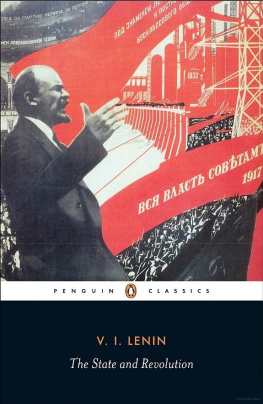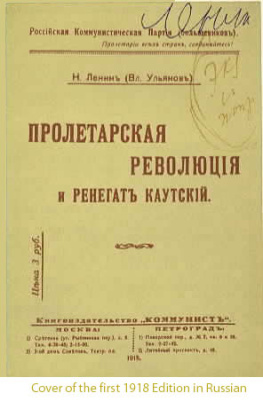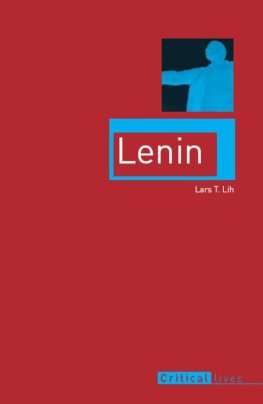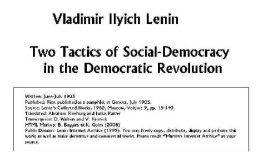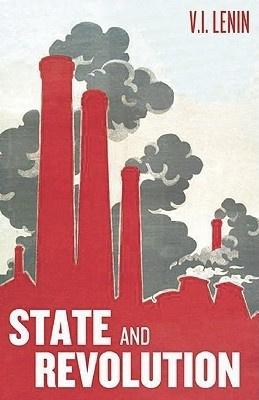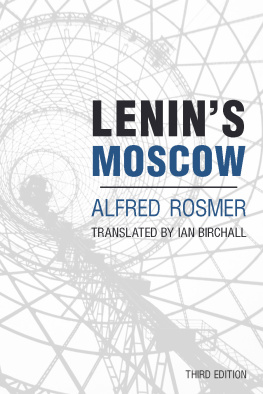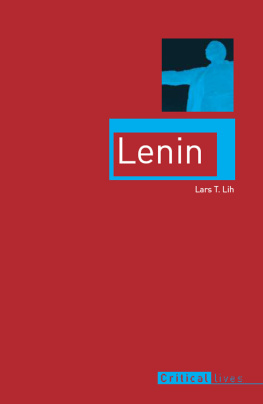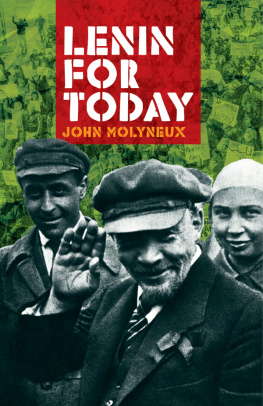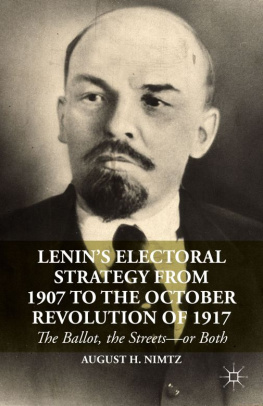Vladimir Lenin - The State and Revolution
Here you can read online Vladimir Lenin - The State and Revolution full text of the book (entire story) in english for free. Download pdf and epub, get meaning, cover and reviews about this ebook. year: 2009, publisher: Penguin, genre: Politics. Description of the work, (preface) as well as reviews are available. Best literature library LitArk.com created for fans of good reading and offers a wide selection of genres:
Romance novel
Science fiction
Adventure
Detective
Science
History
Home and family
Prose
Art
Politics
Computer
Non-fiction
Religion
Business
Children
Humor
Choose a favorite category and find really read worthwhile books. Enjoy immersion in the world of imagination, feel the emotions of the characters or learn something new for yourself, make an fascinating discovery.
- Book:The State and Revolution
- Author:
- Publisher:Penguin
- Genre:
- Year:2009
- Rating:5 / 5
- Favourites:Add to favourites
- Your mark:
- 100
- 1
- 2
- 3
- 4
- 5
The State and Revolution: summary, description and annotation
We offer to read an annotation, description, summary or preface (depends on what the author of the book "The State and Revolution" wrote himself). If you haven't found the necessary information about the book — write in the comments, we will try to find it.
The State and Revolution — read online for free the complete book (whole text) full work
Below is the text of the book, divided by pages. System saving the place of the last page read, allows you to conveniently read the book "The State and Revolution" online for free, without having to search again every time where you left off. Put a bookmark, and you can go to the page where you finished reading at any time.
Font size:
Interval:
Bookmark:
Written:August - September, 1917
Source: Collected Works, Volume 25, p. 381-492
First Published: 1918
Transcription\Markup: Zodiac and Brian Baggins
Online Version: Lenin Internet Archive(marxists.org) 1993, 1999
Converted to eBook format by: anonymous
Lenin wrote The State and Revolution in August andSeptember 1917, when he was in hiding from persecution of theProvisional Government. The need for such a theoretical work as thiswas mentioned by Lenin in the second half of 1916. It was then thathe wrote his note on "The Youth International", in which hecriticised Bukharin's position on the question of the state andpromised to write a detailed article on what he thought to be theMarxist attitude to the state. In a letter to A. M. Kollontai onFebruary 17 (N.S.), 1917, he said that he had almost got readymaterial on that question . This material was written in a smallblue-covered notebook headed "Marxism on the State". In itLenin had collected quotations from the works of Marx and Engels, andextracts from the books by Kautsky, Pannekoek and Bernstein with hisown critical notes, conclusions and generalisations.
When Lenin left Switzerland for Russia in April 1917, he fearedarrest by the Provisional Government and left the manuscript of"Marxism on the State" behind as it would have beendestroyed had he been caught. When in hiding after the July events,Lenin wrote in a note:
"Entre nous, if I am knocked off, I ask youto publish my notebook 'Marxism on the State' (it got held up inStockholm). It is bound in a blue cover. All the quotations from Marxand Engels are collected there, also those from Kautsky againstPannekoek. There are a number of remarks, notes and formulas. I thinka week's work would be enough to publish it. I consider it importantbecause not only Plekhanov, but Kautsky, too, is confused...."When Lenin received his notebook from Stockholm, he used the materialhe had collected as a basis for his book The State and Revolution.According to Lenin's plan, The State and Revolution was tohave consisted of seven chapters, but he did not write the seventh,"The Experience of the Russian Revolutions of 1905 and 1917",and only a detailed plan has remained. In a note to the publisherLenin wrote that if he "was too slow in competing this, theseventh chapter, or should it turn out to be too bulky, the first sixchapters should be published separately as Book One."
Originally, the name F.F. Ivanovsky is shown on the first page ofthe notebook manuscript as that of the author. Lenin intended topublish the book under that pseudonym, otherwise the ProvisionalGovernment would have confiscated it for his name alone. The book,however, was not printed until 1918, when there was no longer anyneed for the pseudonym. The second edition appeared in 1919; in thisrevision Lenin added to Chapter II a new section "ThePresentation of the Question by Marx in 1852".
The question of the state is now acquiring particular importanceboth in theory and in practical politics. The imperialist war hasimmensely accelerated and intensified the process of transformationof monopoly capitalism into state-monopoly capitalism. The monstrousoppression of the working people by the state, which is merging moreand more with the all-powerful capitalist associations, is becomingincreasingly monstrous. The advanced countries - we mean theirhinterland - are becoming military convict prisons for the workers.
The unprecedented horrors and miseries of the protracted war aremaking the people's position unbearable and increasing their anger.The world proletarian revolution is clearly maturing. The question ofits relation to the state is acquiring practical importance.
The elements of opportunism that accumulated over the decades ofcomparatively peaceful development have given rise to the trend ofsocial-chauvinism which dominated the official socialist partiesthroughout the world. This trend - socialism in words and chauvinismin deeds (Plekhanov, Potresov, Breshkovskaya, Rubanovich, and, in aslightly veiled form, Tsereteli, Chernov and Co. in Russia;Scheidemann. Legien, David and others in Germany; Renaudel, Guesdeand Vandervelde in France and Belgium; Hyndman and the Fabiansin England, etc., etc.) - is conspicuous for the base, servileadaptation of the "leaders of socialism" to the interestsnot only of "their" national bourgeoisie, but of "their"state, for the majority of the so-called Great Powers have long beenexploiting and enslaving a whole number of small and weak nations.And the imperialist war is a war for the division and redivision ofthis kind of booty. The struggle to free the working people from theinfluence of the bourgeoisie in general, and of the imperialistbourgeoisie in particular, is impossible without a struggle againstopportunist prejudices concerning the "state".
First of all we examine the theory of Marx and Engels of thestate, and dwell in particular detail on those aspects of this theorywhich are ignored or have been distorted by the opportunists. Then wedeal specially with the one who is chiefly responsible for thesedistortions, Karl Kautsky, the best-known leader of the SecondInternational (1889-1914), which has met with such miserablebankruptcy in the present war. Lastly, we sum up the main results ofthe experience of the Russian revolutions of 1905 and particularly of1917. Apparently, the latter is now (early August 1917) completingthe first stage of its development; but this revolution as a wholecan only be understood as a link in a chain of socialist proletarianrevolutions being caused by the imperialist war. The question of therelation of the socialist proletarian revolution to the state,therefore, is acquiring not only practical political importance, butalso the significance of a most urgent problem of the day, theproblem of explaining to the masses what they will have to do beforelong to free themselves from capitalist tyranny.
The Author
August 1917
The present, second edition is published virtually unaltered,except that section 3 had been added to Chapter II.
The Author
Moscow, December17, 1918
What is now happening to Marx's theory has, in the course ofhistory, happened repeatedly to the theories of revolutionarythinkers and leaders of oppressed classes fighting for emancipation.During the lifetime of great revolutionaries, the oppressing classesconstantly hounded them, received their theories with the most savagemalice, the most furious hatred and the most unscrupulous campaignsof lies and slander. After their death, attempts are made to convertthem into harmless icons, to canonize them, so to say, and to hallowtheir names to a certain extent for the consolation ofthe oppressed classes and with the object of duping the latter, whileat the same time robbing the revolutionary theory of its substance,blunting its revolutionary edge and vulgarizing it. Today, thebourgeoisie and the opportunists within the labor movement concur inthis doctoring of Marxism. They omit, obscure, or distort therevolutionary side of this theory, its revolutionary soul. They pushto the foreground and extol what is or seems acceptable to thebourgeoisie. All the social-chauvinists are now Marxists (don'tlaugh!). And more and more frequently German bourgeois scholars, onlyyesterday specialists in the annihilation of Marxism, are speaking ofthe national-German Marx, who, they claim, educated the laborunions which are so splendidly organized for the purpose of waging apredatory war!
Font size:
Interval:
Bookmark:
Similar books «The State and Revolution»
Look at similar books to The State and Revolution. We have selected literature similar in name and meaning in the hope of providing readers with more options to find new, interesting, not yet read works.
Discussion, reviews of the book The State and Revolution and just readers' own opinions. Leave your comments, write what you think about the work, its meaning or the main characters. Specify what exactly you liked and what you didn't like, and why you think so.

